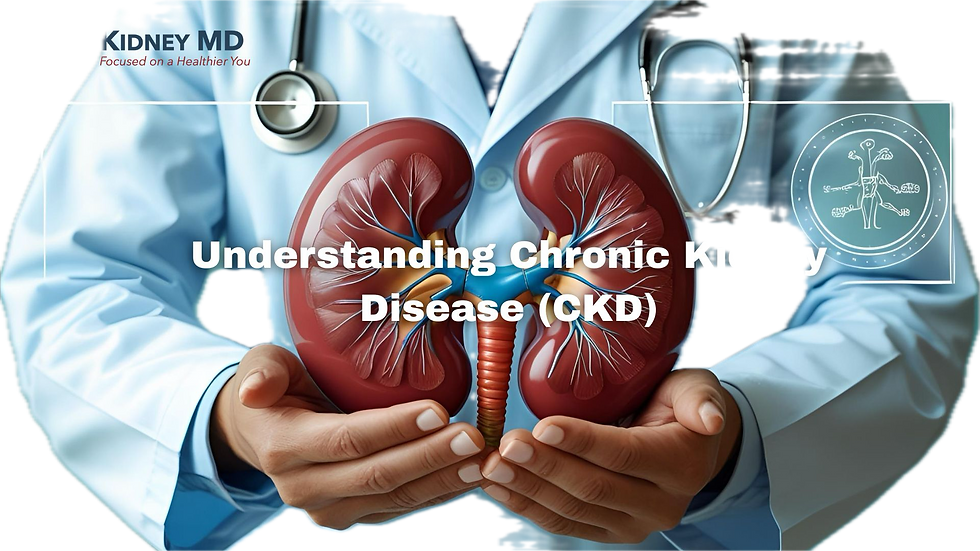When Should You See a Nephrologist?
- AdminKidneyMD
- Sep 26, 2025
- 3 min read

If you’ve ever wondered “When should I see a kidney doctor?” the answer is often sooner than you think. Your kidneys are vital filters that remove waste and excess fluid from your blood. The earlier you take care of them, the better your chances of preventing long-term damage. Nephrologists (kidney specialists) are not only experts in kidney health but also in managing high blood pressure, especially if it’s difficult to control.
Why Early Action Matters
Kidney disease is sometimes called a “silent disease” because it develops slowly and without obvious symptoms. By the time problems like swelling, fatigue, or nausea appear, significant kidney damage may already have occurred. Seeing a nephrologist early—when lab tests first show changes—can help prevent complications, delay dialysis, and protect your overall health.
Key Signs You Should See a Nephrologist

1. Increased Creatinine
Creatinine is a waste product measured on routine blood tests. A normal creatinine level is usually around 0.6–1.2 mg/dLin most adults. If your level is higher—say 1.5 mg/dL or more—it may mean your kidneys aren’t filtering properly.
2. Reduced GFR (Glomerular Filtration Rate)
Your GFR shows how well your kidneys are working.
A normal GFR is 90 mL/min or higher.
60–89 may indicate early kidney disease if any abnormalities are detected in the urine.
Below 60 for three months or more is considered chronic kidney disease (CKD).
Below 30 means kidney function is severely reduced and needs urgent specialist care.
Protein belongs in your blood, not in your urine. Even small amounts (called microalbuminuria, around 30 mg per day) can be a red flag for kidney damage. Larger amounts (hundreds of milligrams or grams) are even more serious.
Blood in the urine—either visible or detected on a dipstick test—should never be ignored. It can signal kidney disease, stones, or other conditions that need further evaluation.
5. Uncontrolled High Blood Pressure
High blood pressure (hypertension) is both a cause and a consequence of kidney disease. If your blood pressure stays above 140/90 mmHg despite using three or more medications (including a water pill/diuretic), this is called resistant hypertension. A nephrologist specializes in treating these tough-to-control cases.
Example Scenarios
Your creatinine went from 0.9 to 1.6 mg/dL—time to see a kidney specialist.
Your GFR dropped from 85 to 55—don’t wait, act early.
Your urine test shows protein 100 mg/dL or “+2 protein”—this needs further evaluation.
Your blood pressure is still 150/95 even though you’re on lisinopril, amlodipine, and hydrochlorothiazide—a nephrologist can help.
Frequently Asked Questions About Seeing a Nephrologist
❓What creatinine level should I see a nephrologist for?
If your creatinine is above 1.3–1.5 mg/dL or has increased compared to your previous results, you should be referred to a kidney specialist.
❓What GFR is concerning?
A GFR below 60 for three months or more suggests chronic kidney disease. If your GFR drops below 30, it’s very important to see a nephrologist immediately.
❓Why is protein in urine serious?
Protein in urine (proteinuria) is one of the earliest signs of kidney damage. Even small amounts (30 mg/day) can signal risk, and larger amounts increase the likelihood of kidney failure if untreated.
❓Why would I see a nephrologist for high blood pressure?
Nephrologists are experts in managing resistant hypertension. If your blood pressure is still above 140/90 mmHg despite taking three or more medications, a nephrologist can help find the cause and control it.
❓Can I see a nephrologist before I have symptoms?
Yes! Kidney disease often has no symptoms in the early stages. Seeing a nephrologist early—at the first sign of abnormal labs—helps protect your kidneys and overall health.
The Takeaway
You don’t have to wait until you feel sick. If your lab tests show increased creatinine, a reduced GFR, protein or blood in your urine, or your blood pressure is still high despite several medications, it’s time to see a nephrologist. Early care can protect your kidneys, prevent complications, and give you more control over your health.




Comments